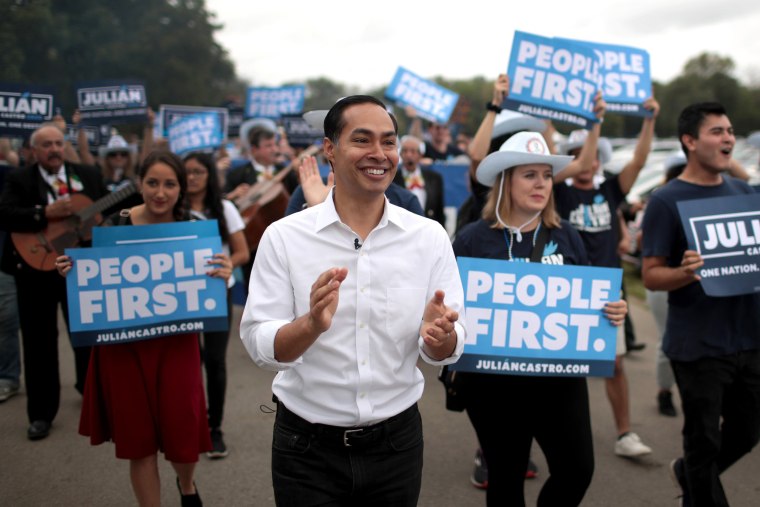Calling the Trump administration the most anti-worker and anti-union in recent history, Democratic presidential candidate Julián Castro unveiled a plan on Wednesday to double union participation and strengthen protections for workers.
Castro’s proposal comes as he is trying to remain in contention for his party's nomination despite low polling that could keep him out of the November debate.
Castro, a former HUD secretary and mayor of San Antonio, qualified for the next debate on Oct. 15 at Otterbein University in Westerville, Ohio. Auto workers in the state are on strike along with other workers at GM factories around the country.
"President Trump's cheap talk and promises to American workers is a complete fraud," Castro said in his plan. "This has been the most anti-worker, anti-union administration in recent history."
Castro's plan calls for doubling labor participation by making it easier to join unions and directing the Department of Labor to support sectoral bargaining — bargaining that applies to all workers in a particular industry.
Throughout his campaign, Castro has reminded voters that his grandmother worked as a maid, a cook and a babysitter and that she cleaned the homes of wealthy families, yet was unable to afford rent and health care. His mom, a single mother, was a community organizer and social justice activist.
“I believe that all work has dignity and all workers should be valued with good pay, solid benefits and the security of a strong union,” Castro said.
He also has joined in various worker strikes and his other proposals have included support for higher wages and tax credits for working families.
Castro pledges to stop states from instituting right-to-work laws that allow employees to work in unionized places without joining a union or paying regular union dues. His plan calls for other measures assisting unions and organizing in workplaces.
He also calls for requiring large, publicly traded corporations to reserve at least a third of board seats for workers elected by non-management employees.
Although he describes his plan as one that assists workers so they can thrive in a 21st century workplace, Castro said he would end gig-economy classification of workers as independent contractors so they can be denied benefits and protections.
He includes in his proposal the farmworkers, who often are left out of labor protections, as well as domestic workers, like his grandmother. He said their concerns would be “front and center” under his presidency and makes a slew of proposals to bring equity to their treatment under U.S. labor laws.
“My mother, like so many organizers in the Chicano movement, was inspired by the activism of the farmworker movement,” he stated in his plan. “I learned from a young age that the people who pick our food or clean homes do hard jobs and deserve respect.”
Union support is almost a must for candidates, even as participation has diminished and regulations have weakened them. In 2018, about 11.6 percent of full-time and 5.4 percent of part-time workers were in labor unions, according to the Bureau of Labor Statistics.
Yet unions not only have provided pools of voters but also money to back candidates. Other Democratic candidates also have proposed union-supporting plans.
In 2016, Donald Trump was able to swing blue-collar workers his way, and Democrats have been hurt by Republican-sponsored laws and regulations that have gutted or weakened unions.
Other provisions in Castro's proposal:
— Prohibit noncompete agreements and franchise nonpoaching agreements.
— Restore the Obama administration overtime rules removed by Trump
— Prohibit the deportation of a farmworker involved in a strike, labor organizing or dispute with an employer.
— Invest $2 billion in a land trust that helps farmworkers become independent farm owners
— Create a Domestic Workers Bill of Rights to raise their pay and labor standards.
Follow NBC Latino on Facebook, Twitter and Instagram.

